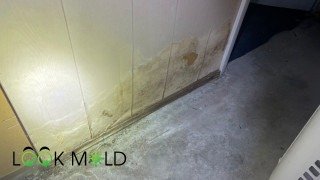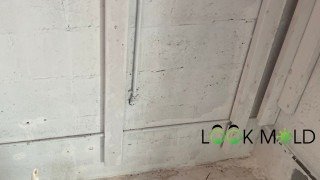Professional Mold Remediation Services
Don't Let Toxic Mold Put Your Family's Health at Risk
Stop mold damage before it spreads. Call now for a free, no-obligation estimate from a local remediation expert.
Free Estimate · Zero Obligation · Available 24/7
Mold in Basement - Is It Dangerous?
Mold grows in basements more prevalent than in the rest of the home mainly because it tends to be humid and moist. There are also many different components that can leak including plumbing lines, sump pumps, and furnaces.
NIEHS reports that there are different basement mold types that are harmful. If you've ever dealt with basement mold, you wouldn't want to go through it again. So it's crucial to understand why and how mold develops in basements.
In this article we will discuss:
- Why mold grows in basements
- Common Types of Mold in Basements
- Does climate matter when dealing with mold in basements
- How to remove mold in basements
- How to prevent mold in basements
Why Do Basements Have Excess Moisture and Mold

Mold grows in basements because of one main issue:
Moisture.
Understanding the causes of the excess moisture and mold in basements is fundamental. Knowing the causes can help you identify mold and stop mold spores from growing in your basement. Additionally, you'll be able to avoid paying for a mold remediation specialist.
Here are a few causes of excessive moisture and mold on basement walls:
Exterior Flooding
The leading cause of the excess mold in basements is exterior flooding. When there are heavy downpours in drains, they create a strong force. These strong forces can overpower basement waterproofing measures.
Things might get worse when the basement floods. Your basement may then begin to sprout mold especially if your basement has many porous surfaces.
Poor Ventilation
Insufficient vents in basements reduce ventilation which causes mold growth. When moisture and poor airflow mix, they cause the basement air to become humid and a breeding ground for mold spores.
Some indications of inadequate ventilation in basements include:
- Musty odors that don't go away
- Windows with frosted appearance
- A stained floor or ceiling tiles
The presence of such signs in your basement indicates insufficient ventilation. Proper ventilation is crucial to prevent promoting mold from growing
A finished basement with an HVAC system can also help remove moisture from the air.
Plumbing Problems
The basements contain the majority of the faucets and drain for household systems. If these faucets begin to leak, a mold growth environment may result. Clogged drains and leaky pipes can also cause mold to grow in your basement.
Additionally, a moist basement may result from standing water on the basement floor. Therefore, ensure you check your faucets every time to keep mold off your basement.
Common Types of Mold in Basements
Black Mold in Basements ( Stachybotrys)
The most prevalent kind of basement mold in finished basements is black mold. Black mold is the most straightforward to spot. Basements with black mold are not something you would wish for.
Black mold will usually grow easier when there are basement leaks compared to other areas of the home due to the high amount of humidity in a typical basement.
Aspergillus
Aspergillus can have hazy, almost fuzzy appearances with black or bluish-green hues. Aspergillus is not known as toxic as Stachybotys but can produce mycotoxins at certain times.
Does Climate Matter When Dealing With Basement Mold?
Yes. When treating basement mold, climate plays a significant role. If your home is in a humid area, your home's basement will likely develop mold. In order to get rid of mold in your basement when in a humid area, certain actions must be taken.
High humidity causes a lot of water, allowing mold to flourish on the basements.
Condensation is another contributing reason to basement mold growth. When the humid air comes in touch with your chilly basement, tiny spores attach themselves to the building material, and mold starts to grow. The condensation-related moisture builds up on the porous materials of your basement, causing mold growth. Maintaining a basement with a low relative humidity level is critical to avoid mold growth.
Damp Soil
Damp soil is a factor in the growing number of states without basements. In states like Florida and Alabama, this is primarily the case. The water table in certain states, like Florida, is less than a meter below the surface.
It is impossible to reach the required basement depth of eight or more feet. You can experience basement mold frequently if your home has a basement in that condition. Therefore, people in such states don't have basements in their houses.
Soil Composition
The makeup of the soil is another factor that causes some states to lack basements. Certain states, like Georgia, contain a lot of clay. Depending on the weather, this soil tends to expand and shrink. When your basement is in this condition, it may cause the soil to contract, which will encourage mold formation.

How To Get Rid of Mold and Moisture In A Basement
Mold in your basement is a dangerous and unsightly invasion. According to the EPA, mold spores require a small amount of basement moisture to begin their rapid growth. Therefore, keep checking your basement to ensure there is no standing water.
In most cases, it's not enough to kill mold because dead mold can affect humans just as much as living mold.
Mold removal in a basement is sometimes complex, and it's hard to tell when to call in professionals. Sometimes your basement floods, and you are unaware of it. In this instance, you require basement mold removal as quickly as possible to prevent mold growth.
You can begin by eliminating all of the water. After your basement has dried out, you can treat mold or have remediation work completed. The type of building materials present in the basement is crucial in determining the course of action to take.
For example, if you have drywall, the basement walls removing mold is necessary. If your basement is unfinished, you can get rid of mold stains using a mold killing solution then scrub it with a stiff bristle brush. Then seal the walls with a moisture blocking primer.

How To Prevent Basement Mold
All year long, mold can develop in your home. However, mold can quickly establish itself in your basements due to damp, dark surroundings. Mold spores are challenging to eradicate once they start to grow.
You wouldn’t want to experience the unsightly basement mold. It can affect your overall health and the attractiveness of your basement. Therefore, being aware of how to prevent basement mold is crucial.
The following are some guidelines on how you can prevent basement mold.
Use a Dehumidifier
Mold is more likely to grow in a basement with limited ventilation. However, using a dehumidifier can aid in halting the growth of mold. Dehumidifiers remove extra moisture from hard-to-reach regions better than fans do.
Invest in a high-quality dehumidifier if you're having trouble regulating high moisture levels in your basement. If your basement floods, it will hasten the drying process. Thankfully with dehumidifiers, you won't have to see your basement with white molds.
Check Your Sump Pumps
Your sump pumps are essential in halting mold growth in your basement. Sump pumps capture surplus water in the foundation of your house and direct it elsewhere. However, your basement is more susceptible to flooding if your sump pump breaks down.
If water overflows in your basement, it may lead to mold growth. Therefore, it is essential to inspect your pumps periodically. This will let you know when they start malfunctioning and replace them as soon as possible. However, if you notice your sump pump is not functioning and there is mold growth, you can find experts for basement mold removal.
Consider Exterior Waterproofing Methods
As crucial as interior waterproofing is, outside waterproofing is also necessary for your house. Any landscaping you do outside will prevent rising water from entering your home. In order to minimize basement flooding, your landscaping should have a good design.
This will aid in reducing the level of moisture that enters your basement. Additionally, your gutters shield your basement from excessive rainwater. Therefore, clean and inspect them more frequently to lessen the likelihood of mold formation in your basement.
Make Sure You Don’t Store Wood in Your Basement
Mold may thrive on organic materials like wood, much like carpeting can. Mold can grow on wood surfaces like fireplace logs and wooden flooring. IACHI states that wood degradation occurs whenever moisture labels in beams of wood exceed 20%. Mold may develop in your basement as a result of this. Therefore, keep wood out of your basement to prevent mold growth.
Remove Stale Air
High humidity levels promote mold growth. The basement is undoubtedly the most humid part of your home because it lies underground. Once the relative humidity in your home exceeds 60%, mold development accelerates.
The dampness in the basement can quickly increase. In these situations, you'll need to blow fresh air in place of the humid air. Instead of putting wet clothing in the basement, hang them upstairs to reduce humidity.
Purchasing an exhaust fan is another method of getting rid of excess humidity. It keeps your basement dry and inhibits the growth of mold.
Minimize Moisture
Keeping your basement dry is another technique to avoid developing basement mold. You must eliminate any remaining moisture in your basement's walls or floor. Make sure you fix any cracked or leaky foundation walls or pipes.
Water can easily enter your basement through cracked or leaking foundation walls or pipes. Ideally, seal all openings to prevent moisture or water vapor from entering. Trained experts can resolve these problems efficiently.
Companies specializing in basement waterproofing can assist in identifying the cause of the extra moisture. This step will help you prevent basement mold.
Remember you don't have to kill mold it doesn't grow in the first place!
Final Thoughts
A basement with mold is dangerous for your health. The structural integrity of your home may diminish because of basement mold. If your house is prone to basement flooding, you must invest in basement waterproofing services. Remember that mold spores can grow beneath the drywall.
If your basement is constantly wet, treating the mold won't help. Additionally, prolonged humidity exposure might harm your house. So, regularly examine your basement for any signs of mold growth.
Your home's value and resale value will increase if your basement is mold-free in every area. By reading this guide, you can learn everything you need to know to prevent mold from growing on your property.
Sources:
https://www.nachi.org/visual-inspection-concrete.htm
https://www.epa.gov/sites/production/files/2016-10/documents/moldguide12.pdf
https://ehp.niehs.nih.gov/doi/10.1289/ehp.1307922
https://www.ncbi.nlm.nih.gov/books/NBK215647/
Explore Related Topics:
Notice an update we should make?
We strive for accuracy. Contact us here if you see incorrect or outdated info on this page.
